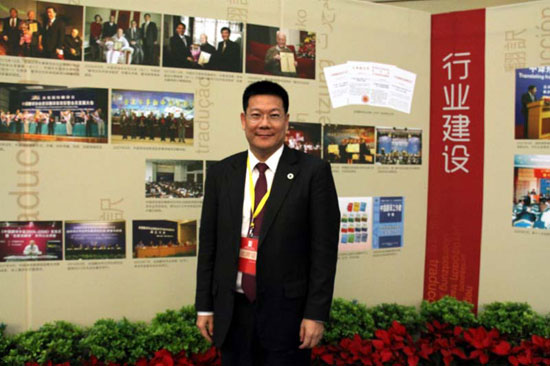MTI initiator: Create translation doctor's degree
- By Zhang Rui
 0 Comment(s)
0 Comment(s) Print
Print E-mail China.org.cn, December 8, 2012
E-mail China.org.cn, December 8, 2012
Veteran educator Zhong Weihe said that China should set up a doctor's degree program in order to boost the translation industry and cultivate its talent as China currently still lacks enough teachers in this category.
|
|
|
Zhong Weihe, President of Guangdong University of Foreign Studies [China.org.cn] |
The 46-year-old president of Guangdong University of Foreign Studies received the Outstanding Contribution to Translation Industry Award at this year's National Conference on Translation held Dec. 6 in Beijing, a day which also marked the 30th anniversary of the Translators Association of China (TAC).
Zhong Weihe is a strong supporter of translation education in China, he also worked as vice director of the China National Committee for Master of Translation and Interpreting (MTI) Education, as well as acting as vice president of the 6th TAC Council. Zhong was the first to launch an undergraduate degree in translation in 2006, and the MTI was established one year later.
"The master degree was approved by the Academic Degrees Committee of the State Council in 2007, " Zhong said, "its goal is to train professional and top level translation talent in order to meet the demands of China's soft power as well as those for the development of economy and society."
Zhong confessed there is still long way to go even though they have achieved great results over the past nearly 5 years. "When we look at if we have achieved enough for China's growing soft power and cultural prosperity, or if we have met the demands for China's philosophy and social science and academic essence to spread overseas, we will have to admit the answer to these questions is 'Not yet'."
As the MTI is meant for nurturing top level skill-applied talent, Zhong hopes the China National Committee for MTI Education will raise the level once again - to doctor degree. "The academic degrees in our country are of two kinds, one is for practice and the other one for research. Translation is such a major that needs to have a doctor degree program and currently the circumstances are suitable for the creation of such a program."
Now there are 159 colleges and universities which feature MTI on their curricula. However, 118 of them only set up the major in 2011. "Even though it is still too early to tell the employment rate such a major carries, according to the statistics based on several thousands who just graduated from the major's first and second test runs across 40 vanguard schools since 2007 and 2009, the employment rate is high. Most graduates find jobs in the practice or teaching of translation," Zhong said.
But China's translation talent major has only just embarked on its journey and many problems and challenges lie ahead. But the biggest one, Zhong said, is the "lack of a high quality teaching team."
"What I mean is a group of teachers that can meet our requirements particularly meant for this major. It is totally different from what we require of a teacher who can teach foreign languages," he said.
"First, we require MTI teachers to have strong translation abilities; second, they should have great teaching capabilities; third, they should have great research abilities," Zhong added, "A team of such teachers who are strong in all three aspects is what every school dreams of but lacks. So since the China National Committee for MTI was established, we have undertaken much work with the TAC to train teachers and we have additionally held various meetings, forums and seminars to do so."







Go to Forum >>0 Comment(s)